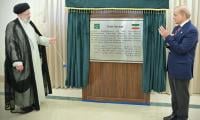ISLAMABAD: With poliovirus viciously proliferating across various parts of Pakistan -- the world’s poorest performing country with 53 polio cases so far in 2019 -- Prime Minister Imran Khan Wednesday called for an “unprecedented public awareness and immunisation campaign” as the government decided to take help from the Pakistan Army for achieving targets of the immunisation campaign.
Speaking as chair of a high-level meeting convened at the PM Office to review Pakistan’s polio emergency, the prime minister expressedserious reservations over the recent spike in cases, and terming polio eradication as a priority intervention area, urged the programme’s leadership at the federal and provincial levels to embark on unprecedented awareness and immunisation campaigns to save children from the crippling disease. With rising number of cases, Pakistan is now being perceived, not only as a threat to its own children, but also as a country that stands to imperil global efforts for polio eradication.
Aside from the chief ministers of Khyber Pakhtunkhwa and Balochistan, Mehmood Khan and Jam Kamal Khan, the meeting was attended by the PM's Focal Person on Polio Eradication Babar Bin Atta, special adviser of the PM on health, Engineer-in-Chief of Pakistan Army, Canadian high commissioner, federal secretary health, chief secretaries of Punjab, KP, Sindh and Balochistan, and representatives from Unicef, WHO, and the Bill and Melinda Gates Foundation.
The premier emphasised that the battle against polio cannot be won without winning over parents. He endorsed both the idea of the polio programme partnering with Ehsaas for synergised implementation, as well as the six-month (November-April 2019) strategy proposed by his Focal Person Babar Bin Atta. The strategy is based on four pillars namely, from push to pull; from disease control to virus eradication; from an ‘orphan programme’ to 100 percent government ownership at the highest level; and complete accountability at the operational level.
Ironically, polio was never an orphan programme because had it been so, Pakistan would not have been so close to eradication only a year ago. Talking to this correspondent, Babar said Grade-20 officers will now be appointed as provincial polio chiefs in all four provinces. He added that over 200 people including vaccinators, supervisors, as well as provincial and district chiefs have been sacked so far, and the cleansing process will continue.
With reference to perception management, Babar said key initiatives will include engagement with social media platforms to counter anti-vaccine propaganda, involvement of mainstream media for public awareness campaigns, establishment of 24/7 call centres, and publicising of environment or human cases. He said four national and two sub-national immunisation campaigns will be conducted between November to April 2019.
Polio profiles of the provinces were presented by their respective leadership. A representative of the Pakistan Army assured extension of absolute support to polio teams in their efforts to access children in far-flung areas.
Representatives of international partner and donor agencies including the World Health Organisation’s Regional Director for Polio Eradication Dr Hamid Jaffery assured their continued cooperation to Pakistan in its polio eradication mission. Unicef Representative Aida Girma-Melaku presented an impartial assessment of the intensified challenges that have impaired the polio programme’s ability to reach every child. She attributed the scenario, not merely to anti-vaccine propaganda, but also to massive population movements within the country and across the borders it shares with Afghanistan; inconsistent and suboptimal campaign quality; inadequate delivery of essential immunisation services; and resistance and refusals by parents and caregivers to immunising children.
Since polio-affected children mostly present multiple deprivations such as stunting, acute malnutrition, and waterborne diseases, Aida hoped that the recent overall shift within the programme to a more integrated approach, particularly through collaboration with EPI and Integrated Service Delivery (ISD), will substantially support essential immunisation including polio eradication and better meet the needs of polio-vulnerable communities. She reiterated UNICEF’s commitment to providing integrated interventions in safe water and sanitation, health and nutrition services to reduce the factors that contribute to polio transmission and reduce refusals.
Meanwhile, Deputy Director of Polio at the Bill and Melinda Gates Foundation Dr Tim Peterson presented to the PM a letter from Bill Gates in which he has expressed concern over the polio situation in Pakistan and “the risk that Pakistan poses to polio eradication, globally.”
“Large number of children in key reservoirs continue to be missed during polio campaigns, in large part due to sub-optimal management and increased community resistance to vaccination -- all of which is allowing the virus to build and continue circulating. Additionally, children are being missed for essential immunisations. These gaps must be addressed quickly,” Bill Gates has pointed out in the letter.
Bill Gates has hoped that Prime Minister Imran Khan would endorse the recommendations and implementation plan being prepared by the independent management review team currently taking stock of Pakistan’s polio programme in high priority districts. The plan, which Gates has described as “a large-scale effort, driving significant changes across your country’s polio programme,” is slated to start before the low season campaigns in November. He has also proposed that consideration be given to oversight and accountability of essential immunisation, as well as collaboration with the polio programme, especially in core reservoirs with low vaccination coverage. “This is an important and under-utilised strategy for stopping polio transmission,” he had stated in the letter.
Pakistan has reported 53 cases of polio so far in 2019. Province-wise breakup of data shows that the situation in KP, which has reported 41 of the 53 cases this year, is one of absolute failure. Of the 41 cases in the province so far, 21 have been reported from Bannu, seven from North Waziristan, five from Torghar, two from Lakki Marwat, and one each from Charsadda, Shangla, DI Khan, Khyber, Hangu and Bajaur. In Punjab, four cases have been reported from Lahore and one from Jhelum. Sindh has reported three cases -- one each from Gulshan-e-Iqbal, Larkana, and Lyari Town; and Balochistan has reported four cases -- one each from Jaffarabad, Quetta and Killa Abdullah. Of the 18 infected districts, 10 are in KP, three each in Balochistan and Sindh, and two in Punjab.
Hospital management responded that only one post of BS-19 was vacant which is to be filled through direct recruitment
PMLN does not have a mandate from the people for privatising the SOEs: says Rabbani
Administrative Service Ali Hussain Malik and made him OSD in the Establishment Division
Establishment Division had notified Rizvi’s appointment as IGP Islamabad on March 30, but the Punjab government...
A British citizen of Pakistani origin has lodged formal complaint against FIA officer, alleging torture during a...
Former COAS admitted the army extended full support to Imran Khan’s government







